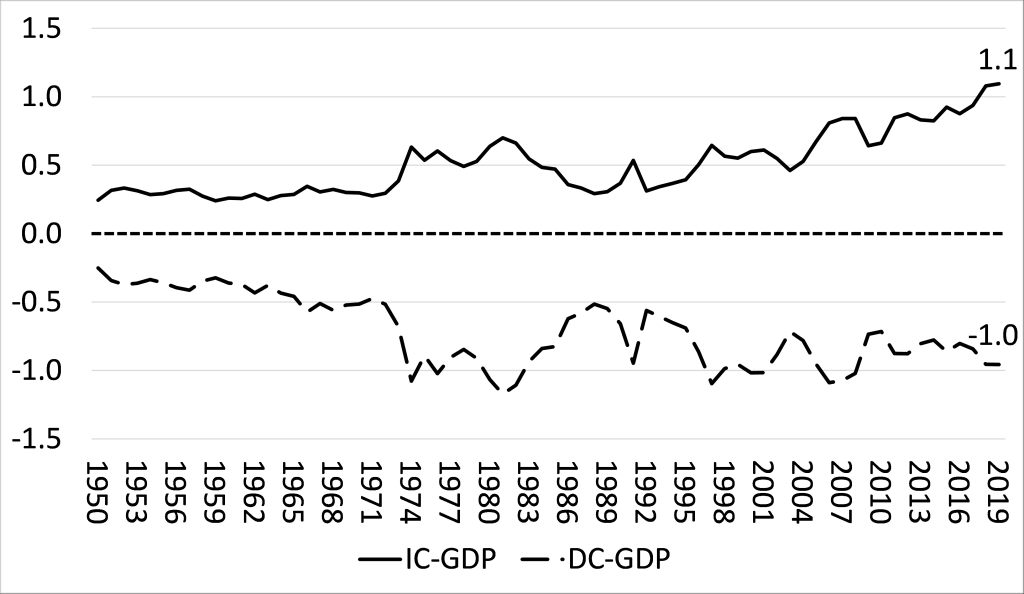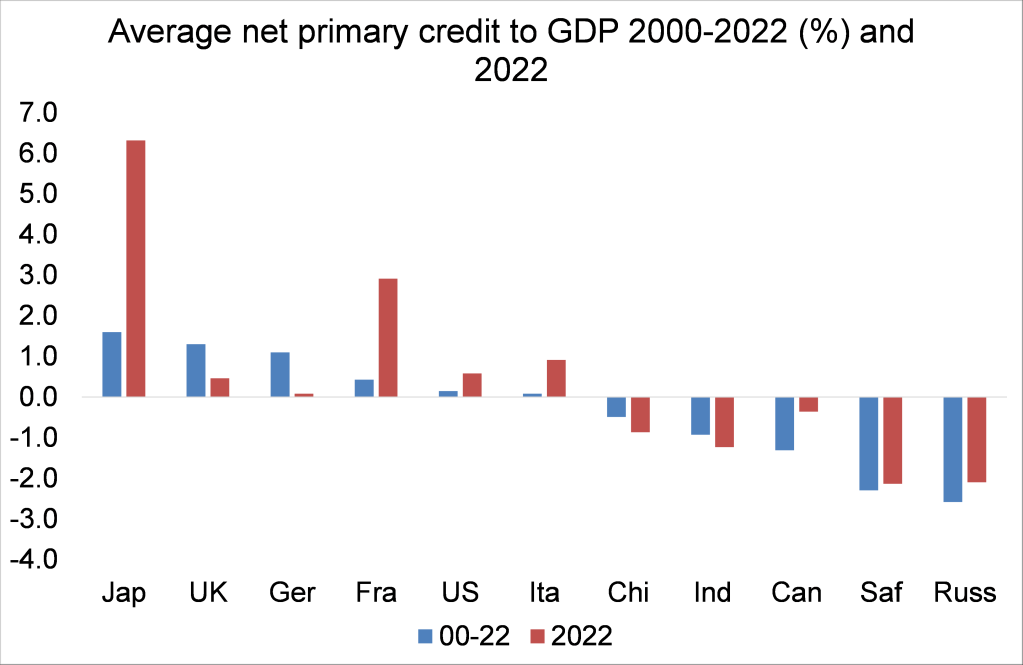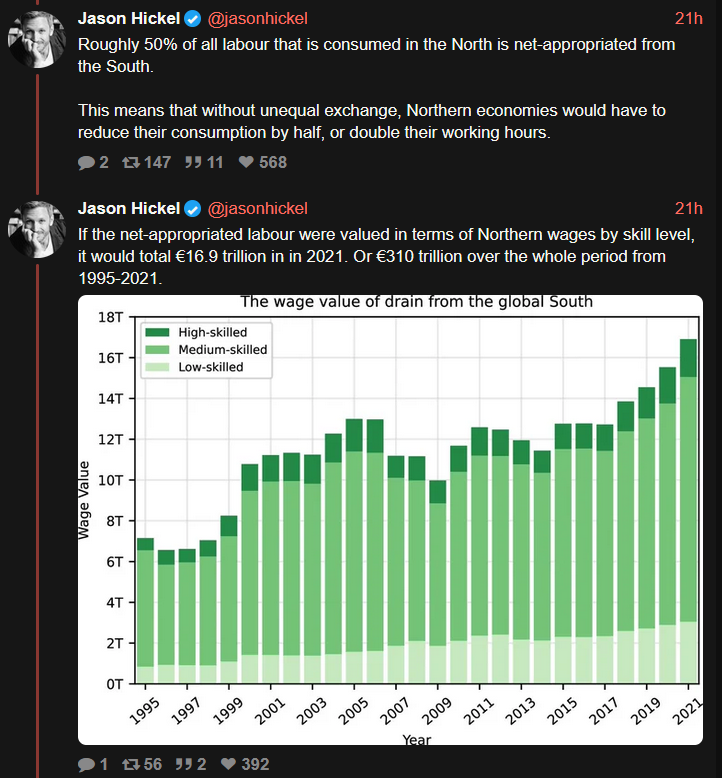theory
A community for in-depth discussion of books, posts that are better suited for !literature@www.hexbear.net will be removed.
The hexbear rules against sectarian posts or comments will be strictly enforced here.
The big takeaway for me is that despite the typical depiction, it’s medium skilled labor that makes up the bulk of the value created by the global south that the global north enjoys, not low skilled labor.
I think those would be the people working in factories who are working building products for export. Domestic goods would be less profitable, meaning lower wages for the workers, but the wealth continues to circulate inside the country. A lot of capital gets tied up in endeavors that are creating surplus value for foreign owners.
Every time I see this guy's name I read it as Jackson Hinkle and am surprised he's having an actually good take.
One of them should change their names, it's poor (or good) branding
And yet Neoliberals still parrot the idea that the Global South actively participates in unequal exchange of their own volition, ergo it's justified.
Plundering.
I don't think this is a stick in the spokes for them, considering how popular chauvinistic geopolotical approaches á la "that country is fucked because all its inhabitants are too dumb to make a liberal democracy work and fight corruption"
“tHeY dOn’T vALue RuLe oF LaW!”
😤
How much of that labour is consumed exclusively by millionaires and billionaires in the North?
AFAIK the advanced consumption habits of the rich come mainly from energy consumption. Like they have (multiple) giant homes so they have to heat and cool them. They fly their families all around the world whenever all the time. They have big fancy cars that use a lot of gas and drive them as much as they want.
But as for, like, commodities, they don't necessarily consume significantly more. Like they buy pants more often and the ones they buy are more expensive, but consumption of pants doesn't grow geometrically with wealth. Like they do consume more goods but they're roughly on the same order of magnitude as other people.
But I'm not an expert I'm dumb so take this with a grain of salt.
Yet received wisdom in the west is that it goes the other way round. Talk to the average westerner about global inequality and you almost always get some version of "We give them so much aid but the non-white brainpan is simply too predisposed towards sloth and corruption for it to work"
Meanwhile we westerners have ridiculously high thoughts of ourselves. Imperialism? Never heard of her, the reason we're rich is simply our superior Judeo-Christian protestant work ethic and our civilised values of free market liberal democracy. Sometimes this autofellation can take absurd forms, just this day I saw a serious news outlet claim that the fact that clothing shops have racks of clothes on the sidewalk outside the shop is somehow the result of an uniquely enviable level of trust and morality.
The average westerner lives in a completely alternate reality. They are no better than medieval peasants who believed that India/Abyssinia/Atlantis was populated by giants, headless people and mermaids.
Very  vibes.
vibes.
To my knowledge there are no western bourgeois economists that are asking these kinds of questions and doing this kind of research. That right there is incredibly telling. You could probably develop an entire sub-field of economics around researching the unequal exchange between global north and global south, and yet no one is drilling into it. I wonder why…
This is some of the most important research Marxian economists can do right now. We all know the very first objection that westerners have to socialism: that it “doesn’t work”, and the fact that western capitalist countries were so much wealthier than AES states like the USSR, DPRK, and Cuba is proof of that. In additional to various historical advantages (colonialism) and improper comparison (why aren’t we comparing Haiti and Cuba instead of the US and Cuba?), so much of why capitalism “works” in the US is exploitation of labor in the global south.
And what this says is… to make a fair comparison, you have to massively increase the cost of most goods that you buy without a corresponding increase in wages. Change that and the living standards for most Americans would fall off a cliff. It’s obvious that the standard of living that most Americans enjoy that they credit to the “miracle of capitalism” is really just from the exploitation of labor in the global south. And on top of that, the American quality of life is also juiced by unsustainable environmental degradation (if everyone consumed like Americans, we would need five earth’s worth of resources to keep up).
Eliminate exploitation of the global south and unsustainable environmental degradation, and American workers would have living conditions similar to what Engels describes in The Condition of the Working Class in England in 1844.
improper comparison (why aren’t we comparing Haiti and Cuba instead of the US and Cuba?)
this has buggered me so much since the first time i ever heard that comparison
it's especially bad when it's someone from the 3rd world spouting that bullshit. "people are leaving cuba to go to the US!!" yea bitch but more people are leaving our country for america too and ours is a fucking capitalist one
Along a similar vein, I see so many libs resorting to saying "Americans are so much better off than 90% of the world's population! Be grateful for what you have!" But why would America want to compare itself to Sudan, Myanmar, or Mozambique? They would rather plunder the global South than change anything about how America functions at a fundamental level
What would a US that isn't exploiting the global South look like for most?
1990s Russia
So hell
mean wage in usa is like 60k i believe, so 30 k +-. (thats before looking a quintiles) perfectly survivable tbh
Right now 30k per year in the US is hardly survivable outside of rural areas. Rent can cost 30k a year in big cities and 30k a year is a minimum wage job.
sans rent, as we are talking about products and commodities. And yeah, it would require  but outside of that its survivable wage, non? even with medical and utilities prices being slightly bonkers
but outside of that its survivable wage, non? even with medical and utilities prices being slightly bonkers
A big difference would also be that all the labor that goes into managing empire would also be able to be put to production for society instead of production for monopoly capitalists. It would ultimately depend on what type of system the US runs under in a hypothetical world where it is moved to semi periphery
This whole thread is why this is one of the best sites on the internet right now
What's a receipt chair?
i think the idea here is that we're watching a wwe wrestling match with all of its theatrics and kayfabe, and jason hickel has snuck up behind the concept of capitalist foreign investment improving material conditions in the global south, and he's holding a chair made of receipts in the form of these charts, and i guess he's going to hit the concept of capitalist foreign investment improving material conditions in the global south with the chair
For those that are interested MR also did a post about this too recently. Further thoughts on the economics of imperialism
There are also a few interesting charts and obvious correlations for example
We found that since the end of WW2, the imperialist bloc (IC) annually got around 1% of their GDP through the transfer of surplus value in international trade from the rest of the major ‘developing’ economies (DC) in the G20; while the latter lost about 1% of their GDP in surplus value transferred to the imperialist bloc. And these ratios were rising.

What I also found was that after accounting for the debits ie income flowing out, the NET position was even starker. The annual net flow of income to the G7 economies was around 0.5% of G7 GDP. Indeed, the top five imperialist economies (G5) obtained a staggering 1.7% of their annual GDP from such net inflows. In contrast, the BRICS economies lost 1.2% of their GDP a year in net outflows.
If you look at the net income flows for each G7 and BRICS countries, the biggest gainers over the last two decades have been Japan with its huge foreign asset holdings and the UK, the rentier centre of financial circuitry. Those BRICS countries that have lost the most (as a share of their GDPs) have been South Africa and Russia.

What's the relationship between unequal exchange theory and Marxist economics? I've seen at least one attempt to theorize unequal exchange as a category directly in Marx's analysis in Capital. But then there's Paul Cockshott who argues unequal exchange theory is un-Marxist because it regresses to a pre-Marxist, moralist notion of exploitation, over the scientific categories explored by Marx and Engels. In Cockshott's opinion, exploitation occurs even when equivalents are exchanged, and therefore there is no need for an unequal exchange theory.
I lean towards the unequal exchange view and see Cockshott's argument being myopic. Just because surplus value is extracted even with the exchange of equivalents, doesn't mean unequal exchange doesn't also persist as a discrete phenomenon. Assuming equivalents are actually exchanged feels very Capital vol. 1 -brained.
But I'm curious if anyone who knows this subject better could help me work through it.
exploitation on supranational scale?
take planet as a whole (a thoroughly marxist notion) producing basket of commodities, you have workers doing socially necessary labor, and receiving equivalent of like 1 hour out of 8 hours worked (of average labor time on the planet). Seems obvious to go to superexploitation thesis. Unequal exchange is not marxist-like, but highlights this dynamic.
Hickel does marxist work, and uses the unequal exchange terms, but i feel like contradiction is surface level at best. Unequality is most obvious when say a bangladeshi worker would try to trade t-shirt she made to union made usa t-shirt. Its exact same t-shirt, one costs 3 dollars, the other 40. And textiles are notoriously badly mechanizable. But if we take planet scale t-shirts we average out that difference, and instead get that bangladeshi worker receives like 1/10th of value and american worker like 7/10 of his value, thus she is superexploited.
I found a YouTube link in your comment. Here are links to the same video on alternative frontends that protect your privacy:
This is an underestimate. It includes China (which I'd argue isn't being exploited), Israel, Iceland and Monaco as global North.
